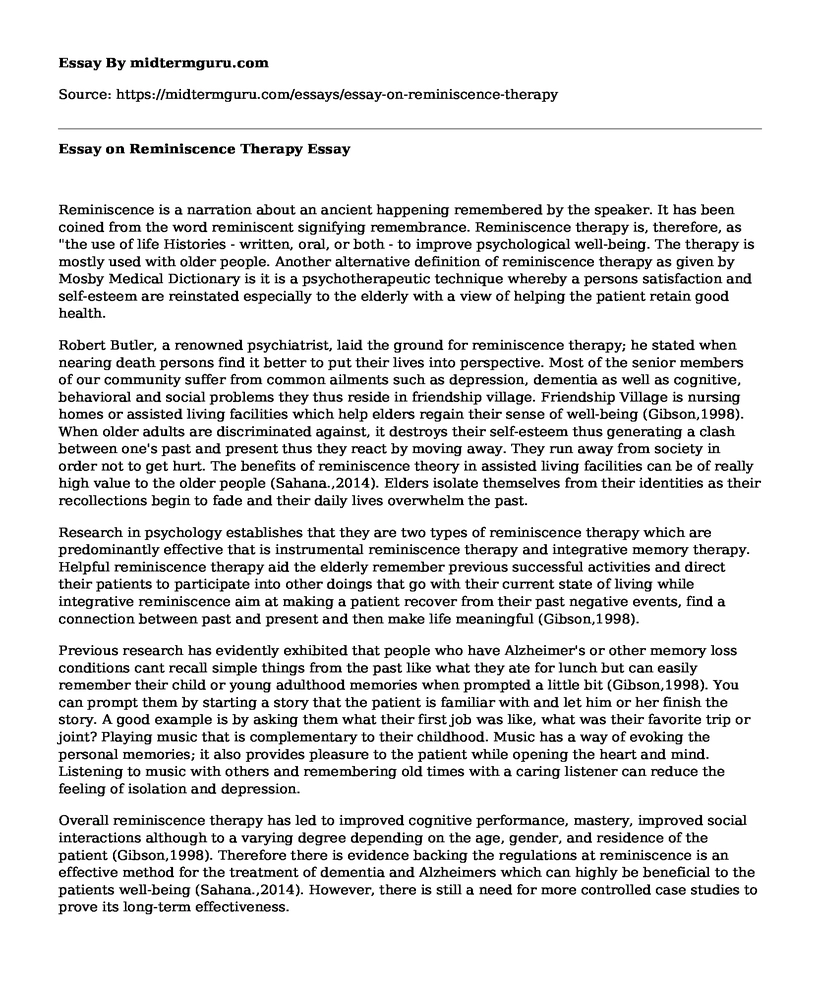Reminiscence is a narration about an ancient happening remembered by the speaker. It has been coined from the word reminiscent signifying remembrance. Reminiscence therapy is, therefore, as "the use of life Histories - written, oral, or both - to improve psychological well-being. The therapy is mostly used with older people. Another alternative definition of reminiscence therapy as given by Mosby Medical Dictionary is it is a psychotherapeutic technique whereby a persons satisfaction and self-esteem are reinstated especially to the elderly with a view of helping the patient retain good health.
Robert Butler, a renowned psychiatrist, laid the ground for reminiscence therapy; he stated when nearing death persons find it better to put their lives into perspective. Most of the senior members of our community suffer from common ailments such as depression, dementia as well as cognitive, behavioral and social problems they thus reside in friendship village. Friendship Village is nursing homes or assisted living facilities which help elders regain their sense of well-being (Gibson,1998). When older adults are discriminated against, it destroys their self-esteem thus generating a clash between one's past and present thus they react by moving away. They run away from society in order not to get hurt. The benefits of reminiscence theory in assisted living facilities can be of really high value to the older people (Sahana.,2014). Elders isolate themselves from their identities as their recollections begin to fade and their daily lives overwhelm the past.
Research in psychology establishes that they are two types of reminiscence therapy which are predominantly effective that is instrumental reminiscence therapy and integrative memory therapy. Helpful reminiscence therapy aid the elderly remember previous successful activities and direct their patients to participate into other doings that go with their current state of living while integrative reminiscence aim at making a patient recover from their past negative events, find a connection between past and present and then make life meaningful (Gibson,1998).
Previous research has evidently exhibited that people who have Alzheimer's or other memory loss conditions cant recall simple things from the past like what they ate for lunch but can easily remember their child or young adulthood memories when prompted a little bit (Gibson,1998). You can prompt them by starting a story that the patient is familiar with and let him or her finish the story. A good example is by asking them what their first job was like, what was their favorite trip or joint? Playing music that is complementary to their childhood. Music has a way of evoking the personal memories; it also provides pleasure to the patient while opening the heart and mind. Listening to music with others and remembering old times with a caring listener can reduce the feeling of isolation and depression.
Overall reminiscence therapy has led to improved cognitive performance, mastery, improved social interactions although to a varying degree depending on the age, gender, and residence of the patient (Gibson,1998). Therefore there is evidence backing the regulations at reminiscence is an effective method for the treatment of dementia and Alzheimers which can highly be beneficial to the patients well-being (Sahana.,2014). However, there is still a need for more controlled case studies to prove its long-term effectiveness.
References
Gibson, F. (1998). Reminiscence and Recall: A. Guide to good practice. London.
Sahana, M., Bhandary, P. V., & Latha, K. (2014).Reminiscence therapy: An overview.
Cite this page
Essay on Reminiscence Therapy. (2021, Jun 30). Retrieved from https://midtermguru.com/essays/essay-on-reminiscence-therapy
If you are the original author of this essay and no longer wish to have it published on the midtermguru.com website, please click below to request its removal:
- My Own Theory of Personality - Essay Sample
- Paper Example on Psychoeducational Framework for Depressed Adolescents
- Teaching Men to Be Emotionally Honest - Research Paper
- Experience with Psychiatrists - Essay Sample
- Can Money Make You Happy? - Paper Example
- Isolation the Elderly Research Paper
- Paper Example on Treatment of Bipolar Disorder







